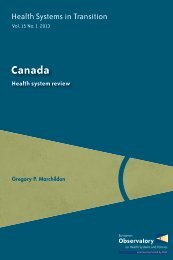Health Systems in Transition - Hungary - World Health Organization ...
Health Systems in Transition - Hungary - World Health Organization ...
Health Systems in Transition - Hungary - World Health Organization ...
Create successful ePaper yourself
Turn your PDF publications into a flip-book with our unique Google optimized e-Paper software.
168<br />
<strong>Health</strong> systems <strong>in</strong> transition <strong>Hungary</strong><br />
transparency (2008/7). This was the third and most elaborate attempt s<strong>in</strong>ce<br />
the early 1990s to <strong>in</strong>troduce a system of multiple, compet<strong>in</strong>g health <strong>in</strong>surers to<br />
<strong>Hungary</strong>. (For details on the two previous attempts, see section 2.2.)<br />
A bill <strong>in</strong>troduc<strong>in</strong>g managed competition to the SHI system was approved by<br />
the National Assembly <strong>in</strong> December 2007, but vetoed by the President shortly<br />
thereafter. In February 2008 the National Assembly overrode the presidential<br />
veto and passed the bill <strong>in</strong> the face of widespread public protest. At the same<br />
time, the ma<strong>in</strong> opposition parties <strong>in</strong>itiated a referendum, which was held <strong>in</strong><br />
March 2008, on user charges for physician visits and hospital stays and on tuition<br />
fees <strong>in</strong> state-funded higher education. By an overwhelm<strong>in</strong>g majority of more<br />
than 80%, voters approved a measure revok<strong>in</strong>g both measures. In the meantime,<br />
the opposition parties had signalled their <strong>in</strong>tention to hold a referendum on the<br />
legislation for managed competition <strong>in</strong> September 2008. Expect<strong>in</strong>g that this<br />
would have the same outcome as the referendum held <strong>in</strong> March of that year, the<br />
National Assembly repealed the act <strong>in</strong> May 2008. This created what is most<br />
likely an unprecedented case <strong>in</strong> the history of the Hungarian lawmak<strong>in</strong>g, with<br />
the same parliament approv<strong>in</strong>g a law twice and then repeal<strong>in</strong>g it with<strong>in</strong> the<br />
space of six months. This situation caused the Alliance of Free Democrats to<br />
leave the govern<strong>in</strong>g coalition, lead<strong>in</strong>g to a break-up of the government and the<br />
formation of a m<strong>in</strong>ority government by the Hungarian Socialist Party.<br />
If the managed competition model had been implemented, the NHIFA/HIF<br />
would have been replaced with 22 jo<strong>in</strong>t-stock companies. In each company,<br />
49% of the stocks would have been sold to private <strong>in</strong>vestors and 51% would<br />
have rema<strong>in</strong>ed <strong>in</strong> state ownership. The m<strong>in</strong>ority private stockholder, however,<br />
would have nom<strong>in</strong>ated the CEO and had decid<strong>in</strong>g power to <strong>in</strong>fluence daily<br />
management. It would have been possible for a s<strong>in</strong>gle <strong>in</strong>vestor to have a stake <strong>in</strong><br />
more than one company, but only if the total number of <strong>in</strong>dividuals <strong>in</strong>sured by<br />
these companies did not exceed 2 million. Insurers would have been expected<br />
to compete for enrolees through the quality of their services, and they were<br />
to form jo<strong>in</strong>t commissions at the national level to advise the government <strong>in</strong><br />
purchas<strong>in</strong>g decisions.<br />
Adm<strong>in</strong>istrative costs would have been limited to 3.5% of the revenue, which<br />
is approximately twice the percentage currently <strong>in</strong>curred by the NHIFA.<br />
The HISA<br />
With the stated aim of <strong>in</strong>creas<strong>in</strong>g accountability and transparency, a plan<br />
to establish the HISA was presented <strong>in</strong> June 2006 (2006/10). Do<strong>in</strong>g so was<br />
considered by the government to be a precondition for <strong>in</strong>troduc<strong>in</strong>g managed<br />
competition to the health <strong>in</strong>surance system (Government of the Republic of
















